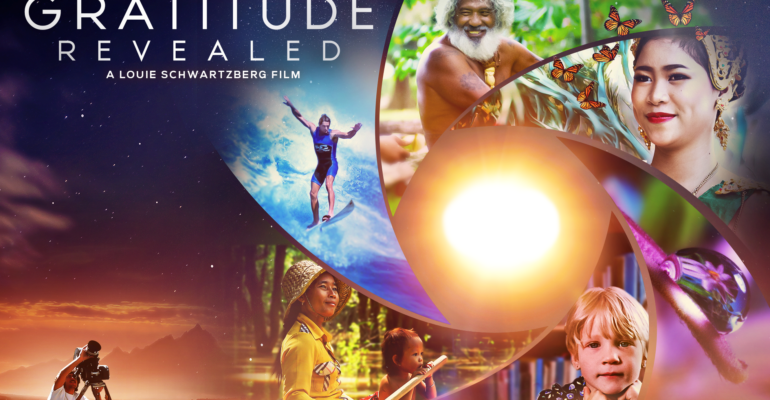Gratitude and Longevity?
November 16, 2022 2022-11-16 19:09Gratitude and Longevity?

Gratitude and Longevity?
A few weeks ago, I watched the wonderful documentary Gratitude Revealed by Louie Schwartzberg.
Schwartzberg is most known as the director of Fantastic Fungi and the Netflix series Moving Art.
His speciality is high-end, time-lapse cinematography that creates very unique films.
Gratitude holds the same beauty as those previous films but centers on us.
Humans making their way through life.
I cried throughout the film, which is 15 shorts, beginning with children and ending with elders.
One of the elements that struck me was the inspiration of physical loss or death as the motivator of gratitude later in life, say 30+.
I spend a great deal of time speaking with people who work in longevity.
For example, our 2020 conference featured the psychology of aging with the incomparable Alex Zhavoronkov.
Alex is one of the world’s leading figures in longevity and AI driven drug discovery as the founder of Insilico.
In the next 50 years, we will dramatically extend our lifespans and healthspans.
For example, people are talking about 120 year healthspans.
And while you may have recently heard that the global population just hit 8 billion, statistically birth rates will begin to drop dramatically and decline, in many countries below replacement rates during this same period.
By then, we will no doubt be growing organs and have improved medicine in a way that will decrease physical loss as we know it today.
This then begs the question — how do we teach gratitude for its own sake when we no longer have looming mortality and physical loss to shortcut us to a paradigm shift about the preciousness of life?
For myself, my mother passed the month after I graduated from college.
My father, in my early 30s.
And I have lived long enough to have lost friends too soon.
I have witnessed elders fighting against the encroachment of age and young people fighting for their lives from accidents.
And in the midst of this, I think — we never know when it is our turn.
Savor the now.
How do you think we can teach loss-less gratitude?
VR Rites of Passage?
Tech Gap Years?
Daily reminders?
We’re going to have to develop something.
Any ideas?
Love,
Nichol
P.S.S. Here’s the rest of the series:
- Love and Tech, Tech and Love
- The New Science of Emotion and Transformative Tech: Why it matters
- Experiences as validated Mental Health Treatments?
- Evolution Favors Fitness, Not Reality 😯
- Augmented Imagination
- Human Syncing and Group Flow
- Humanizing the Singularity
- Six Takeaways From My Day-to-day Work
- Overview: Deep Human – Warm Up
- Build while Being
- My Core Premise
- Growth Triangle
- The Choice
- The Growth 🔼 – The Metaverse — a Growth Triangle for Billions?
- Design Principles – The Metaverse as Human Potential Tech
- The Stack
- My Origin Story — And Why We Need Human Embodiment AND Technology
- The Metaverse (and the Future of Human Intelligence)
- A New Oath to Take? Defining Modern Neurorights
- Blockchain for Transformation?
- Collaborative Capacity
- How are Paradigm Shifts a Growth Tool?


Comments (2)
Luke
I think that we need better means of developing gratitude than learning to cope with loss and grief because they are horribly inefficient methods and just as often fail as succeed. I know many people whom loss turned bitter and angry instead of more forgiving and loving. And I have met lots of very nice young people who are nice perhaps because they haven’t been traumatized by loss yet.
For myself, the experience of long and intense mental and physical illness led to the loss of my youth and early adulthood and has not done anything but leave a very bad taste in my mouth. Maybe only about 5% of the suffering I have endured has actually ‘taught’ me anything. The only things that have truly helped me become a better person are skillful means directed at weakening the grip of illness over me and directly – not indirectly – attacking ignorance and delusion at their source.
Basically, leaving such an important virtue as gratitude up to the whims of fortune and different personalities is something that shouldn’t be tolerated anyway, and the prospect of greatly increasing lifespan and healthspan is forcing our hand to develop better methods.
Mary Alber
Another great question, Nichol.
I think VR simulations (done well) could be the answer to any hard question these days. Just like a good movie can break our hearts open (and bring forth those healing tears) through good storytelling, VR experiences like GoogleEarth can tell us stories about our gorgeous, precarious planet and 8 million unique humans around the globe. To bring the awe, empathy and gratitude that is essential to live our lengthening lives with joy and contribution of our talents to the benefit of all!